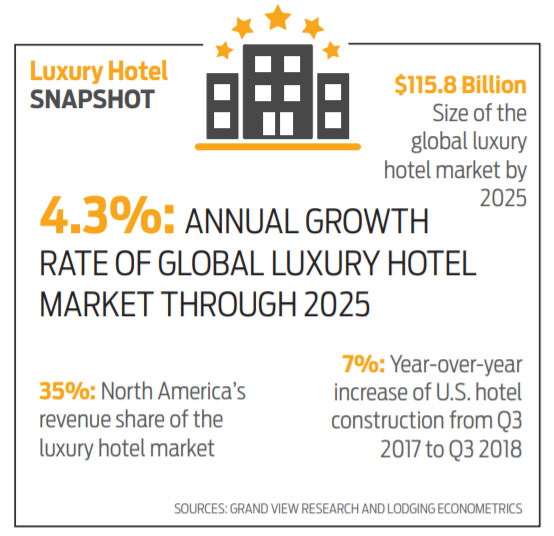May 10, 2019
How to Target the Luxury Hotel Market
Luxury hotels are filling rooms, which is leading to more demand for on-brand merchandise and uniforms.
Takeaways:
1. Networking opens up new opportunities.
2. Growing regions lead to tourism and busier hotels.
3. Clients have high expectations.

The Pro: Aric Bayer; Title: Account Executive; Company: PromoShop (asi/300446), Los Angeles
Generate Leads By Networking
“I’ve made connections with local hoteliers, managers and those who run lobby stores. I cater to a wide array of hotels all over the country. It’s important to stay connected with contacts because there are new opportunities for you when they move to another hotel.”
Offer a Wide Range of Products
“Hotels need items for gift shops, uniforms and collateral for visitors bureau events. For one posh hotel, we’ve done candles, branded nail polish, T-shirts, hats, robes, towels, socks and eye masks. They’re sold in their stores and also given away to mid- and high-tier clients. Hotels also like leave-behinds that are procured locally.”
Help luxury hotels target millennials: 61% choose luxury options when traveling, compared to 48% of Gen Xers and 35% of Baby Boomers. — (L.E.K. Consulting)
Get Ready for Growth
“My portfolio numbers have increased year-over-year. There’s a push in LA to hit 50 million visitors by 2020. The World Cup is coming in 2026 and the Olympics in 2028. There’s an area called Silicon Beach because there’s so much aerospace and tech. Luxury hotels are running at good capacity right now, and it’s a very competitive market.”
Prepare to Serve Discerning Clients
“Demand from luxury hotels is going to climb over the next few years. Relationships mean a lot. They provide a high level of service, and they expect the same. Good service on the part of the distributor doesn’t go unnoticed and it’s reciprocated. The more proactive you can be, the better.”
Statistics

Niche Spotlight: Boutique Hotels
With very specific branding and unique marketing needs, boutique hotels are ideal for distributors looking to target a discerning client base with fashion-forward uniforms and high-end promotional products. (Renowned boutique hotels in the U.S. include The Inn of the Five Graces in Santa Fe, NM; The Jefferson in Washington, DC; and Auberge du Soleil, Napa Valley, CA.) While they can be either independent locations or part of a larger chain, they differ in many ways from large hotels and resorts, according to TripSavvy. Here’s how:
- They’re small, with no more than 100 rooms (anything under 10 is technically an inn or bed and breakfast).
- They pride themselves on offering five-star personal service and actively eschew the impersonal “chain hotel” feel.
- The décor is often modern and flashy and shows off civic pride of the area in which it’s located.
- Dining is important – the in-house restaurant often has high-end offerings and a trendy bar that attracts passersby.
- With fewer restrictions than larger hotels, many are dog-friendly.
Watch This
In this video, “Start With Why at Your Hotel,” Alex Velazquez, the former global director of B2C Marketing for WorldHotels, shares his insights on how hotels can boost their marketing strategy and how that’s driven by the hotel’s unique “why.” Watch it below: